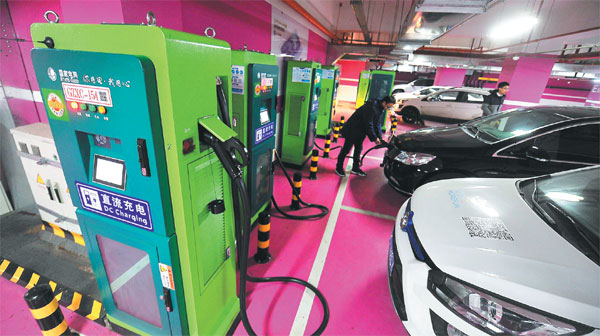China's auto sector headed for smoother ride
By Zhong Nan | chinadaily.com.cn | Updated: 2019-04-23 17:19

Boosted by the sales of high-end vehicles and new energy vehicles, China's auto industry continues to diversify. With the rapid development of digital technologies, as well as new entrants with abundant cash backing, the growth of China's auto industry will be on a firmer footing in the long run, said experts from KPMG.
Even though many carmakers from both domestic and global manufacturers saw auto sales in China flatten or contract this year, this was balanced by the relatively stable sales of high-end cars, SUVs, and new energy vehicles. The second-hand and aftermarket businesses will create positive momentum for the country's auto market, said Norbert Meyring, Industrial Manufacturing and Automotive sector head for KPMG China. Vehicle financing is also expected to be a growth driver in the medium term.
"Digital technology is increasingly reshaping each sub-sector of the auto industry, including MaaS (Mobility as a Service), autonomous driving and new energy vehicles," he said, adding that in recent years, investment into the auto industry in China has spawned a number of innovative startups.
In order to introduce these latest automotive market trends and innovators to the world, KPMG recently published the 2018 Autotech 50, which highlights Chinese startups, their niche, footprint, and their potential impact on the sector. Many of these companies make use of the increasing amount of data generated by drivers and automobiles to create new business models or services. China is driving a shift to a more digital-driven mobility model.
To respond to this digitization, auto manufacturers are putting digitization higher on their agenda. According to KPMG's recent publication, Digital Gravity, digitalization is not a product but an enabler to have a new business model, with over 80 percent of executives in China seeing the need to rethink their existing models, and more notably, considering partnership models with tech-based entrants and even competitors.
Meyring stressed that the decade-long golden age of high automobile sales is ending, and that the next decade will be one of transformation. Innovative new ways of marketing, establishing channels, and completing transactions are multiplying. Following the evolvement of the "New Retail" concept, enterprises engaged in automobile e-commerce and automobile leasing are entering a new era and are increasing investment.
"The 'New Retail' era has also impacted the after-sales market, raising the bar on user experience and operational efficiency," said Philip Ng, Technology sector head at KPMG China, noting these new developments are reshaping the value chain of the automotive sector.
He said chips for new generation smart vehicles become the focus of research and development efforts. Besides traditional automobile chips, Ng said new battlefields have emerged in areas such as sensor chips, AI chips for autonomous driving, gateway chips, intelligent cockpit chips and insulated-gate bipolar transistors. In particular, artificial intelligence chips for smart and connected vehicles have become an area of strategic importance for both start-ups and mature companies.
According to Ng, automated driving accidents have caused the whole industry to re-examine the pace of the commercial implementation of automated driving and the safety challenges the industry faces. Various countries are working to establish a unified and effective set of safety and testing standards for automated driving. In addition, the data security of next generation intelligent network has also attracted more attention.
China is the world's second-largest automobile market, trailing only the United States. Despite declining growth in the assembled car market, sales of high-end vehicles have continued to rise as Chinese consumers now expect more from their vehicles, said Zhao Ying, a researcher at the Institute of Industrial Economics of the Chinese Academy of Social Sciences in Beijing.























